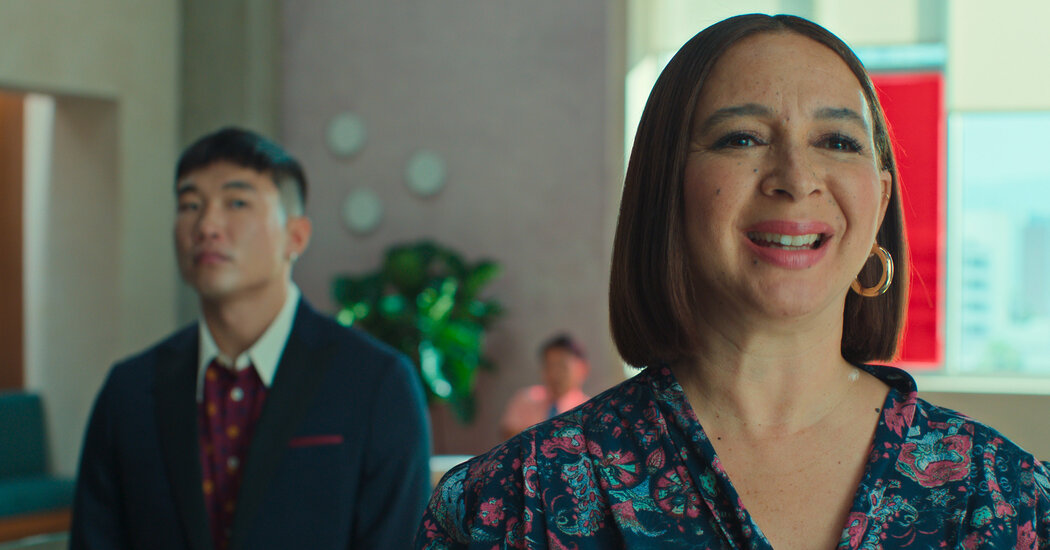
If you’re going to center a sitcom on a character who, post-divorce, is the third-richest woman in America, casting Maya Rudolph is a smart move.
Molly Novak, the heroine of the new Apple TV+ series “Loot,” is a tech gazillionaire’s soon-to-be-ex wife who is kind and funny and, as played by Rudolph, childishly delighted by her lavish lifestyle. Rudolph’s seamless blend of wisecracking bravado and unassuming charm — among contemporary actresses, she’s the easiest to imagine in a 1930s Hollywood comedy — keeps us on Molly’s side as she overhauls her life and her attitudes across 10 episodes.
For one of those episodes, it’s easy to be on the side of “Loot,” too. The show opens with Molly en route to the oversized yacht that her husband, John (Adam Scott), is giving her for her 45th birthday. “Can we turn the sun down, like, 20 percent?” she asks, half seriously, simultaneously mocking and celebrating their megarich status.
The caricature of extreme wealth is, in the first episode, unrelenting and pretty funny, from Seal’s guest appearance to sing “Happy Birthday” (he’s upset to learn that Michael Bolton sang it at one of Molly’s earlier birthdays) to Molly’s awkward attempts to open the doors of John’s candy-colored, aerodynamic sports cars. That screwball energy resurfaces here and there later in the series, particularly in a running gag featuring David Chang as Molly’s personal chef, constantly apologizing that his restaurants take his attention away from her.
That first half-hour is action packed: Molly and John’s marriage predictably implodes; Molly emerges from their divorce with $87 billion and goes on a transcontinental partying jag; finally, back in Los Angeles and feeling lost, she gets a phone call from the director of the charitable foundation she didn’t know she had and decides to check it out.
And then “Loot,” for the most part, goes off a cliff, the pleasures of the first episode feeling more and more like the setup for a joke that never arrives. Satire takes a holiday, replaced by tired workplace comedy, unconvincing romantic comedy and a level of sentimentality that’s beyond even what the show’s creators, Alan Yang and Matt Hubbard, could have gotten away with when they worked on “Parks and Recreation.”
Some of this can be blamed on the general pablum-for-the-pandemic effect that has gripped situation comedy for the last few years. But the problems with “Loot” go beyond that. It’s understandable that the show wants to make Molly as sympathetic as possible, but it presents her with hardly any conflict at all beyond her own comic weaknesses; Scott, whose plastered-on smarm is perfect for John, hardly shows up after the opening.
You can feel a juggling act going on: The show wants to mock Molly’s privileged cluelessness and then also, as her work with the foundation reorients her moral compass (or simply shames her), to score points for reforming her and for offering facile reflections on class and gender. Its attempt to make that straddle is halfhearted, however — one indication of the show’s divided consciousness is the strange way in which no one comments on Molly’s wealth, or acts strangely around her, unless there’s a particular message being delivered.
Most of the time is taken up by the mildly amusing, limply formulaic high jinks of the foundation staff, who include the forbidding director, Sofia (Michaela Jaé Rodriguez of “Pose”), a sweetheart of a tech guy (Ron Funches) and a normie accountant with a crush on Molly (Nat Faxon). They’re all fine, and Joel Kim Booster, as Molly’s personal assistant, can be bitingly funny when the script gives him a chance. But their roles are so softly drawn that their performances don’t have a chance to register.
Rudolph, meanwhile, sails through “Loot” like the captain of Molly’s gigantic yacht, oblivious to the rough waters. The show is structured as a series of epiphanies, as Molly takes her journey of self-discovery and learns how the little people think; Rudolph, with her extraordinarily expressive features, makes us feel every new revelation. She can’t make us forget, though, that the first episode’s depiction of the fakery of privilege is the only real thing in the show.




